Global

I can’t deny the unbridled excitement that this global phenomenon unleashes every four years. And since this year’s tournament is taking place in November (to avoid Qatar’s crushing summer heat), the international fervor coincides with the start of Advent. Somehow, it all feels fitting.
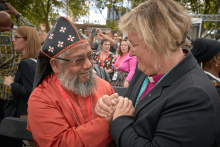
The WCC convenes an assembly only once every eight years. The agenda always includes electing a new, 150-member Central Committee, approving reports and making formal statements on pressing international issues. But that’s not at the heart of what happened in Karlsruhe, nor has it been in the four previous WCC Assemblies I’ve attended.

Even while Brazil is a COVID-19 global hot spot, some pastors flout social distancing.

The way presidents and governments use language reflects the society they want to construct — and for the United States, presidents have long attempted to build a narrative that hides he real impacts of war and makes the United States look the part of a noble hero. Crisis and pandemics don’t start wars, and they won’t end war, but the United States may use crisis to beat the drums of war.

In Narendra Modi’s India, an ominous new project is in progress. The recently instituted National Registry for Citizens (NRC) in Assam excludes almost 4 million from citizenship – effectively creating one of the largest groups of stateless people anywhere in the world. A majority of them are Muslims, and while those of other faiths can apply for reconsideration, Muslims cannot. Reports indicate plans to implement NRCs in other borderlands.
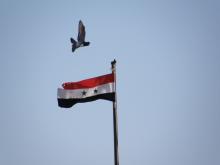
Given the extreme physical and existential threats facing Christians in Syria, support for Assad and the Syrian Army likely come as a surprise to those who view the state as a primary cause for the community’s plight. Why would a group frequently targeted for state-sanctioned violence continue to pay lip service to a murderous regime?
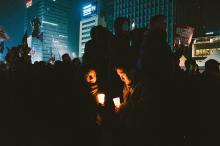
We cannot leave the fate of our world and our future generations exclusively to the political leaders of our time. As Christian citizens of every nation, we have a responsibility to bear witness to the things that make for peace.
RIGHT FROM THE beginning, John Carr saw Pope Francis as a “great sign of hope.”
Carr, who spent more than two decades as the U.S. bishops’ top peace and justice officer, was home, working at his kitchen table, when the white smoke came up announcing the selection of the new pope. “I thought, ‘Oh, my,’ and this guy I didn’t recognize came out,” Carr said. “When he said the name ‘Francis,’ I thought ‘it’s going to be okay.’”
As executive director of the Department of Justice, Peace, and Human Development at the U.S. Catholic bishops’ conference, Carr carried a rather large portfolio. He often tells the story of being introduced by a man who said, “He’s in charge of social development and world peace.” The man’s wife, in Carr’s telling, looked at him and said, “You need to do a better job.”
Since leaving the bishops’ staff last year, Carr has launched a new initiative, based at Georgetown University, aimed at helping lay people “become more informed and engaged in their vocation to be ‘salt, light, and leaven’” in public life. Carr, who visited Sojourners’ office this spring, is encouraged that the election of Pope Francis “has provided incredible visibility, urgency, and passion” around social issues. “When he was going to be elected, his friend said, ‘Don’t forget the poor,’” Carr explained. “A church that moves to the edge to care for the weak and vulnerable is a church you want to be a part of.”
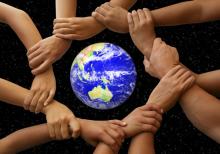
Just peace theory begins with the idea that peacemaking, peacekeeping, and peace building is a day-by-blessed-day proposition. Unlike just war theory, it does not begin when violent conflict is imminent. There are 10 just peacemaking practices that have a record of success. A just peace foreign policy employs these practices for the purposes of both national security and of international peace.
The 10 just peacemaking practices are: support nonviolent direct action; take independent initiatives to reduce threat; use cooperative conflict resolution; acknowledge responsibility for conflict and injustice, and seek repentance and forgiveness; advance democracy, human rights, and interdependence; foster just and sustainable economic development; work with emerging cooperative forces in the international system; strengthen the United Nations and international efforts for cooperation and human rights; reduce offensive weapons and weapons trade; encourage grassroots peacemaking groups and voluntary association. (Just Peacemaking: the new paradigm for the ethics of peace and war Glen H. Stassen editor)
Cooperation, interdependence, human rights, and democracy are important elements of just peacemaking practices. I say this is a power-with, not a power-over model of foreign policy. This is not a model of weakness, but one of strength. The strength comes from building relationships and partnerships with other nations on the basis of mutual respect.

NEW YORK — Manhattan was a traffic nightmare as the United Nations General Assembly was in session and security precautions ramped up.
Iran's president gave his usual insulting address. Israel's prime minister volleyed with dire warnings of Iran's nuclear-weapons intentions. Not much was expected of a session that was more political podium than problem solving.
But the event did underscore a reality that Americans often overlook: Not everything is about us. The world doesn't turn on a politician's latest line of attack. The fine points of Obamacare or Mitt Romney's 1040 or Paul Ryan's budget? Meh.
On the one hand, this unconcern is nothing unusual; hometown affairs are always of far more interest to locals than to anyone else. I could go months without caring about Kate Middleton's topless cavorting or political show trials in Beijing.
On the other hand, it is good to be reminded that we are one piece of a vast global mosaic. We connect with others but aren't necessarily the center.
Rather than proceed as a nation-level version of the "narcissistic princess" — as one reviewer labeled tell-all author Monica Lewinsky — we should pay more attention to the connections among us.
Every year, somewhere between US$200 billion and $1 trillion are spent in “mandatory” alms and voluntary charity across the Muslim world, Islamic financial analysts estimate. At the low end of the estimate, this is 15 times more than global humanitarian aid contributions in 2011.
With aid from traditional Western donors decreasing in the wake of a global recession, and with about a quarter of the Muslim world living on less than $1.25 a day, this represents a huge pool of potential in the world of aid funding.
http://www.irinnews.org/Report/95564/Analysis-A-faith-based-aid-revolution-in-the-Muslim-world
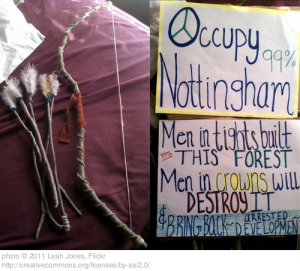
With the opening of the G20 Summit in Cannes, France today, an idea that's been around for awhile is in the news again and gaining more attention as a result of the #OWS movement: The so-called "Robin Hood tax," a minimal tax on all financial transactions with the resulting revenue dedicated to anti-poverty programs....Archbishop of Canterbury Rowan Williams, in his response to the occupation of St. Paul's Cathedral in London, endorsed the Vatican proposals. Williams observed that "people are frustrated beyond measure at what they see as the disastrous effects of global capitalism," and urged a full debate on "a Financial Transaction Tax
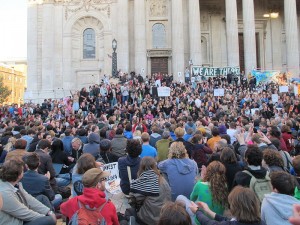
On Sunday (10/30), the Anglican Bishop of London, the Rt. Rev. Dr. Richard Chartres, met with Occupy London protesters who have encamped for several weeks now on the ground of St. Paul's Cathedral in London, in an ongoing attempt to get the demonstrators to leave church grounds.
Chartres wants the Occupiers to vacate cathedral property and stopped short, in an interview with the BBC yesterday, of saying he would oppose their forcible removal. Other British clergy, however, are rallying behind the demonstrators, saying they would physically (and spiritually) surround protesters at St. Paul's with a circle of prayer or "circle of protection."
(+Video may contain coarse language+)
Indie music darling, Jeff Mangum, who rarely plays in public, surprised #OccupyWallStreet protesters in New York City earlier this week with an impromptu concert. A New Jersey singer-songwriter pens two songs for revolutions. And an order of Catholic nuns offer free mp3 downloads of a protest song inspired by the life of St. Francis of Assisi.
Live, streaming video from #OccupyWallStreet in New York City
Won't it reduce our dependence on Middle Eastern oil? Won't somebody else develop the Alberta tar sands if the U.S. doesn't do it -- someone like China, perhaps?
I've been wrestling with many of these issues as I contemplate risking arrest as part of two weeks of sustained protest by leading environmentalists, climate scientists, and faith-based groups at the White House forth to pressure the Obama Administration to block the Keystone XL Pipeline. This pipeline project will connect Canadian tar sands -- containing the second largest and dirtiest oil reserves on the planet -- with the oil refineries in Texas.
The earth dries up and withers ... The earth is defiled by its people; they have disobeyed the laws, violated the statutes, and broken the everlasting covenant. - Isaiah 24:4-6
Today I have given you the choice between life and death, between blessings and curses. Now I call on heaven and earth to witness the choice you make. Oh, that you would choose life, so that you and your descendants might live! - Deuteronomy 30:19
During the 1980s, many Christians were at the forefront of a movement to avert nuclear annihilation. They saw this transcendent threat as a moral crisis and felt a responsibility to nonviolently resist, including acts of civil disobedience and divine obedience. Today, we face a comparable danger -- a climate catastrophe which could decimate life on earth. Yet it seems not to have been picked up on the Christian "radar screen" in the same way. For this reason, it is actually more insidious.
